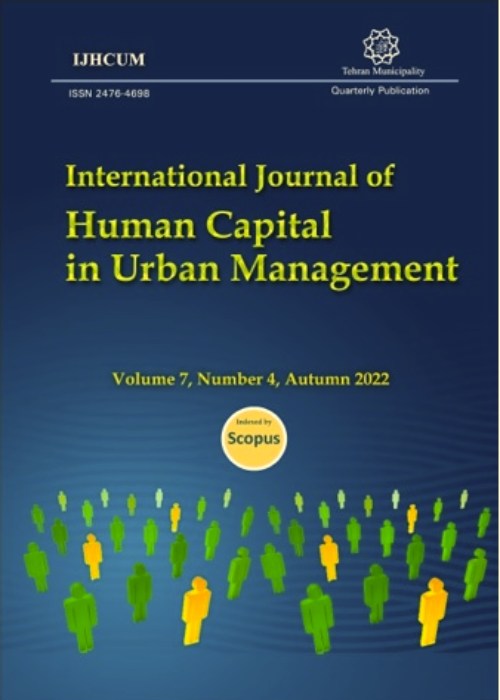Defining the social-sustainable framework for smart cities
Author(s):
Article Type:
Research/Original Article (دارای رتبه معتبر)
Abstract:
BACKGROUND AND OBJECTIVES
Smart cities have been criticized for being too technologically driven and reinforcing entrepreneurial thinking rather than focusing on citizens and social sustainability. This paper aims to “define the implementing principles for Smart Cities in Tehran as a social construct”. In this regard, this study tries to develop smart city indicators and suggest a set of implementing principles for smart cities, citizens, and civic organizations in Tehran. Furthermore, this paper illustrates how in-progress smart city projects are meeting the citizens' needs in 22 districts of Tehran Municipality.METHODS
The present study has used a qualitative and quantitative methodology based on theoretical frameworks. In this paper, Maslow's hierarchy of needs acts as a meta-method for defining the principles of social sustainability to implement smart city projects. First, smart sustainable cities and associated indicators were evaluated based on Maslow’s hierarchy of needs. Second, a case study approach was utilized to assess Tehran’s smart city projects. Finally, the Strengths, Weaknesses, Opportunities, Threats and Quantitative Strategic Planning Matrix techniques were used to define strategies based on internal and external environmental factors and relation to social sustainability.FINDINGS
The results indicated that promoting innovation centers and living labs to create a vibrant, active, and healthy public realm was the most effective strategy for smart city development in Tehran (Weaknesses-Opportunities8=.1.323). Two important additional strategies were “involve stakeholders and focus on people and consider urban residents not only as recipients or users of smart cities but also as designers of smart cities” (Strengths-Opportunities3=1.075) and “promote community involvement in council decision-making by developing interactive platforms” (Strengths-Opportunities8=0.884).CONCLUSION
This paper contributes knowledge on how cities such as Tehran can achieve and implement social sustainability using a smart city approach. Plans and projects for a smart city in Tehran were deemed neither realistic nor sufficiently strategic, and they are assumed to satisfy neither policymakers nor citizens. Social sustainability-based principles and strategies are necessary to incorporate citizen perspectives into Tehran’s smart city plan and policies. The present study adds several significant insights to the existing frameworks for implementing smart city frameworks in Tehran.Keywords:
Language:
English
Published:
International Journal of Human Capital in Urban Management, Volume:8 Issue: 1, Winter 2023
Pages:
95 to 110
https://magiran.com/p2526174
دانلود و مطالعه متن این مقاله با یکی از روشهای زیر امکان پذیر است:
اشتراک شخصی
با عضویت و پرداخت آنلاین حق اشتراک یکساله به مبلغ 1,390,000ريال میتوانید 70 عنوان مطلب دانلود کنید!
اشتراک سازمانی
به کتابخانه دانشگاه یا محل کار خود پیشنهاد کنید تا اشتراک سازمانی این پایگاه را برای دسترسی نامحدود همه کاربران به متن مطالب تهیه نمایند!
توجه!
- حق عضویت دریافتی صرف حمایت از نشریات عضو و نگهداری، تکمیل و توسعه مگیران میشود.
- پرداخت حق اشتراک و دانلود مقالات اجازه بازنشر آن در سایر رسانههای چاپی و دیجیتال را به کاربر نمیدهد.
In order to view content subscription is required
Personal subscription
Subscribe magiran.com for 70 € euros via PayPal and download 70 articles during a year.
Organization subscription
Please contact us to subscribe your university or library for unlimited access!



